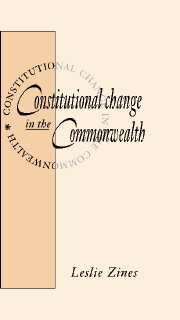2 - The entrenchment of individual and democratic rights
Published online by Cambridge University Press: 14 September 2009
Summary
Nineteenth-century and early twentieth-century complacency regarding individual rights in Britain, and a certain contempt for countries that had a need for entrenched constitutional rights, were reflected in the ‘old Dominions’. The common law, British justice, and remedies such as habeas corpus and the prerogative writs, were regarded as of more worth in protecting the individual than elaborate and exotic lists of abstract rights in foreign countries.
While certain rights of this nature appeared in the Australian Constitution, they certainly didn't amount to a fully fledged Bill of Rights, and in any case most of them were binding only on the federal as distinct from the State Governments. Perhaps the general attitude in all these countries could be summed up in the remark made by a former Australian Chief Justice, Sir Harry Gibbs, that ‘If society is tolerant and rational, it does not need a Bill of Rights. If it is not, no Bill of Rights will preserve it.’
Faith in majoritarian democracy was firmly established in all four countries by the early twentieth century. This reinforced the legal principle of the supremacy of Parliament. The obedience paid by the courts to what was sometimes called ‘the will of Parliament’ was politically justified on the basis of democratic principle, reflecting Dicey's distinction between the ‘legal sovereign’ (Parliament) and the ‘political sovereign’ (the electorate).
- Type
- Chapter
- Information
- Constitutional Change in the Commonwealth , pp. 33 - 74Publisher: Cambridge University PressPrint publication year: 1991



